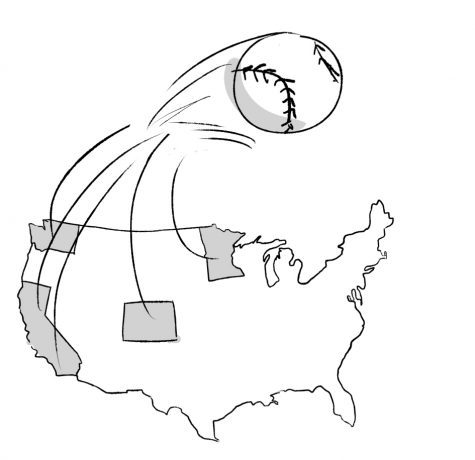Sports Column: Rob Manfred Takes Steps Toward Ruining Baseball
February 25, 2017
As Major League Baseball and its commissioner Rob Manfred look to speed up the pace of play, a new rule has been implemented for the 2017 season. The new rule changes the way a batter is intentionally walked (given a free trip to first base), also referred to as an IBB: intentional base on balls. Instead of tossing four balls to the catcher standing way outside the zone, the batter will now be walked with just a signal from the team manager in the dugout.
The rule change has been very controversial, sparking much criticism from both fans and players who think the rule does more to hurt the game than help it.
First of all, this rule saves a negligible amount of time. Last year an intentional walk occurred every 2.6 games on average. An intentional walk takes perhaps a minute to perform, meaning that this rule change will save around 23 seconds per game. In 2016 the average MLB game took 3 hours and 6 minutes to complete. This is hardly even a dent.
Often intentional walks occur during the most intense parts of the game. IBBs can be used to avoid strong hitters in high leverage situations and set up double plays. They often occur when the batting team has a runner on second or third base during a close score game. In a sport driven by tension, eliminating these moments works against making the game exciting by shortening these weighted situations.
It is a false assumption that nothing exciting can happen during an intentional walk. Just last season Yankee rookie Gary Sanchez took a swing on an IBB pitch and hit a sacrifice fly to the warning track. In 2006 Miguel Cabrera hit a go ahead single in the tenth inning off of an intentional ball. With the ball being thrown so slowly, baserunners also occasionally have the opportunity to steal a free base during the process.
The ability for a pitcher to perform an intentional walk should also not be taken for granted, as they can sometimes end in disaster. A similar phenomenon can be observed in pitchers like Jon Lester, who often struggles to throw the ball to first base in a pick-off move. When not throwing 90 down the middle, it can mess with a pitcher’s head. On the very day the MLB announced this rule change, the Texas A&M baseball team won a game during an intentional walk when a wild pitch allowed a runner on third base to score. A similar lay to the Chicago White Sox in 2011, and although it may not always determine the game, wild pitches have occurred instead of intentional balls all the time in the MLB.
Many players are not happy with the rule change either. In an interview with Sportsnet, Blue Jay’s catcher Russell Martin said, “My thing is, if they really want to speed up the game, then when a guy hits a home run, to speed up the game should a guy, just like in softball, when he hits it, should he just walk to the dugout? It’d be quicker. I’m just wondering, at what point do we just keep the game, the game?”
Commissioner Manfred seems to have a different opinion, believing that changes to the game should be embraced. “I think it’s a mistake to stick our head in the sand and ignore the fact that our game has changed and continues to change … I’m firmly convinced that our fans—both our avid fans and casual fans—want us to respond to and manage the change that’s going on in the game,” he said.
Many would argue that this new rule change is so slight it does nothing to attract a new audience, but only works to alienate current fans. This is the top of a possible slippery slope of rule changes that would dramatically alter the game. Fans are wondering “what’s next?” as ideas such as a pitch clock or automatically starting with a base runner during extra inning games are being discussed and implemented at lower minor league levels.
My opinion is as simple as that of Atlanta Braves first baseman Freddie Freeman: “I don’t think we should be changing the game at all. It’s a beautiful game the way it is.”






Mike • Mar 14, 2018 at 4:31 pm
Manfred works for Putin.. ruins a game I so loved…
Bill • Mar 8, 2017 at 10:54 am
What irks me most about this delusional clown is that he wants to somehow increase offense while at the same time shortening the length of the games. Having more offense/runs scored means getting more baserunners and more baserunners means more plate appearances, which by default means longer games. It’s basic logic.
While I strongly oppose this egregious IBB rule change, in and of itself it doesn’t totally train wreck the game since there are so few of them within a game and since IBB SNAFUs like the examples your article cited are rare occurrences. However, it does feel a bit like the turning of the key to unlock Pandora’s box, and it’s only a matter of time before the box is opened and MLB is transformed into an arcade style baseball simulation filled with 13-11 snooze fests condensed into games that are reduced from 9 innings to 6 in order to keep the game time under 3 hours.
We can only hope this idiot either resigns or gets fired before the game of baseball is reduced to that or something to that effect.